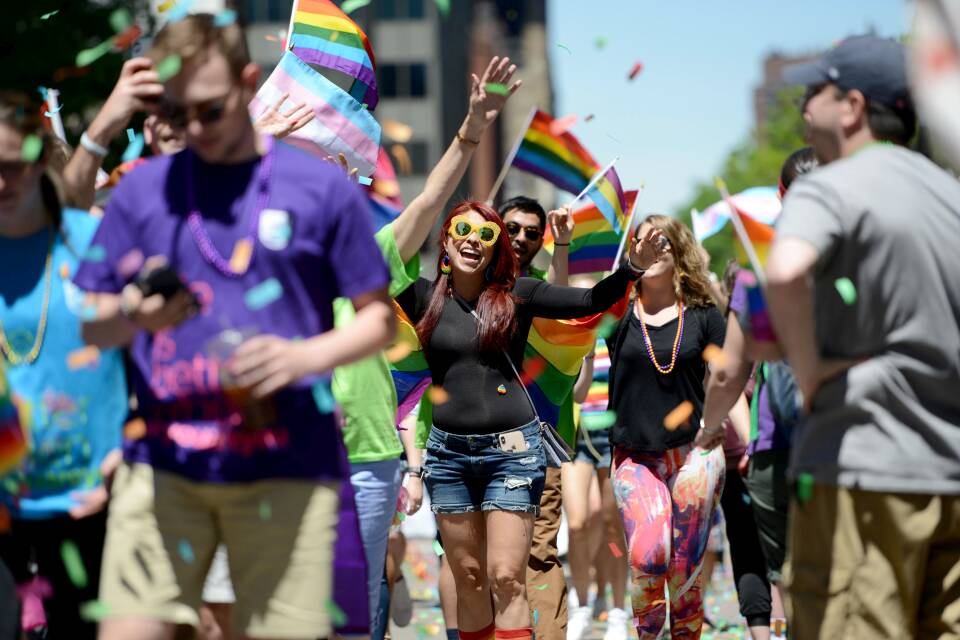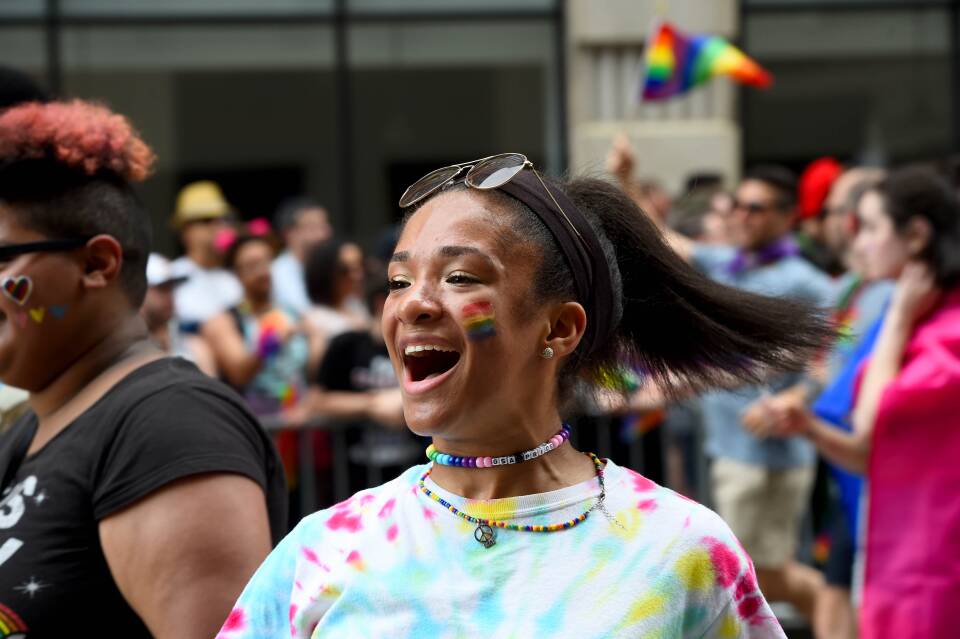Criticism of Boston Pride for the People surfaced this week ahead of the organization’s Boston Pride parade on Saturday. Multiple local advocacy and activist groups are asking for “no cops, no corporations, no pride in genocide” across social media and in a letter to the organization made public Thursday afternoon.
While concerns about corporate involvement in Pride consistently come up from some LGBTQ+ advocacy groups, this year brings a renewed emphasis on disassociating with companies that have ties to Israel and the war in Gaza.
One group that’s been outspoken on social media is Jewish Voice for Peace’s Boston chapter, a pro-Palestinian organization. Chapter member Eli Gerzon expressed concerns with corporate sponsors for Saturday’s parade.
“An event that’s for queer liberation will support queer people and will support Palestinian people, will be anti-racist, and will not have corporations that play a terrible role in those struggles,” said Gerzon.
“So many queer people support Palestinian liberation,” Gerzon added. “And so it’s just especially upsetting to see the biggest queer events in Boston have so many ties to the oppression of Palestinians.”
On Wednesday evening, Boston Pride for the People released a statement calling for an immediate ceasefire in Gaza and for the release of Israeli, Palestinian and American hostages.
“We hear the call to action and we welcome it,” Matt Wilder, a spokesperson for Boston Pride for the People, told GBH News.
A letter to Boston Pride for the People asked the group to refuse money from any pro-Israel organizations as well as refusing all corporate sponsorship, including a list of specific sponsors this year. The letter was cosigned by dozens of local organizations, including the Boston Democratic Socialists of America, several pro-Palestinian clubs at local colleges, ACT UP Boston and United American Indians of New England (UAINE).
When it comes to accepting corporate sponsorship, Wilder said Boston Pride for the People — organizing Boston’s Pride Parade for the second time this year — takes pride in “doing extensive research before accepting donations.” The organization outlines tools for assessing corporate sponsorship on its website.
Wilder noted that, this year, they rejected money from sponsors who didn’t meet the organization’s qualifications.
The event is expected to bring over a million people into the city for the largest Pride parade in New England.
Joan Ilacqua is the executive director of The History Project, which preserves archives of New England’s LGBTQ+ history. She spoke to GBH News about what, exactly, Pride has historically stood for.
“Looking at a longer history of Pride, there have always been, I think, debates, disagreements, and, sometimes protests against what organizers of Pride have done or are doing to recognize Pride Month,” she said. “The LGBTQ+ community is a very intersectional community, and so as far back as the ’70s and ’80s, we see people voicing different opinions about what should be prioritized, who should be allowed to march.”
In recent memory, she said, there have been three organized and publicized protests. The Wicked Pissed protest in 2015, the Sin Justicia, No Hay Orgullo (Without Justice, There Is No Pride) protest in 2017, and the No Justice No Pride protest in 2018.
And, in 2021, the organization that used to put together Boston’s flagship Pride event — Boston Pride — dissolved itself under criticism that it wasn’t inclusive enough of people of color and transgender people. Last year, under Boston Pride for the People, was the first time since 2019 that Boston has hosted its main Pride parade.
“Even in the recent history of Boston Pride for the People, that organization really grew out of protest against the last Pride organization ... for its refusal to center queer and trans people of color in Boston,” Ilacqua said.
On social media, many pointed to the Boston Dyke March as an alternative Pride event in Boston. The Boston event was founded in 1995 as a response to the corporatization of Pride, including the use of “pinkwashing.”
“It makes us feel good that people really love our event,” said Wolf Hamel, who is mostly known by their last name, a committee member with the march.
“We have had a longstanding criticism of mainstream Pride events around corporations,” said Hamel. “We don’t believe, as an organization, that corporations should be allowed at Pride.”
In the six to seven years Hamel has been involved, they say the organization has grown substantially as a younger generation embraces these values. Without corporate sponsorship, Hamel says the event is able to operate sponsorship by keeping “expenses as low as humanly possible.”
They partner with other organizations in the city, fundraise within the community, have received micro grants from the city and have sold merchandise to bolster funding.
“People aren’t asking Boston Pride for the People to not exist,” said Hamel. “People are asking for them to be better, to meet the moment. ... We want them to respond to the demands of the community because that is what they should be for. They should be for the communities.”
Concerns brought forward by advocacy and activist groups will inform how the organization moves forward, said Wilder with Boston Pride for the People. He says the organization is fully volunteer-run and was officially launched last year.
“As this evolves and as we grow and as next year takes shape, we will certainly be looking, and retooling how we evaluate our sponsors and make sure that we are really taking a hard look at the criteria we use,” he said.
“We’re going to be hearing from various members of our community, we want to be held accountable. And as an organization, we are striving to do better every, every day,” Wilder added.
Editor’s note: GBH is the public media sponsor of Boston Pride for the People and a GBH employee resource group will be marching in Saturday’s event.









